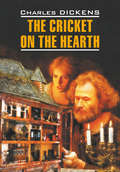
Чарльз Диккенс
Tales from Dickens
A TALE OF TWO CITIES
Published 1859

CHARACTERS

A TALE OF TWO CITIES
I
HOW LUCIE FOUND A FATHER
A little more than a hundred years ago there lived in London (one of the two cities of this tale) a lovely girl of seventeen named Lucie Manette. Her mother had died when she was a baby, in France, and she lived alone with her old nurse, Miss Pross, a homely, grim guardian with hair as red as her face, who called Lucie "ladybird" and loved her very much. Miss Pross was sharp of speech and was always snapping people up as if she would bite their heads off, but, though she seldom chose to show it, she was the kindest, truest, most unselfish person in the world. Lucie had no memory of her father, and had always believed he also had died when she was a baby.
One day, however, through a Mr. Lorry, the agent of a bank, she learned a wonderful piece of news. He told her that her father was not dead, but that he had been wickedly thrown into a secret prison in Paris before she was born, and had been lost thus for eighteen long years. This prison was the Bastille – a cold, dark building like a castle, with high gray towers, a deep moat and drawbridge, and soldiers and cannon to defend it.
In those days in France the rich nobles who belonged to the royal court were very powerful and overbearing, and the rest of the people had few rights. One could be put into prison then without any trial at all, so that many innocent people suffered. Lucie's mother had guessed that Doctor Manette (for he was a physician) had in some way incurred the hatred of some one of the nobles and had thus been taken from her; but all she certainly knew was that he had disappeared one day in Paris and had never come back.
For a year she had tried in every way to find him, but at length, desolate and heartbroken, she had fallen ill and died, leaving little Lucie with only Miss Pross, her English nurse, to care for her. Mr. Lorry himself, who told Lucie this story, having known her father, had brought her, a baby, to London in his arms.
Now, he told her, after all these years, her father had been released, and was at that moment in Paris in charge of a man named Defarge, who had once been his servant. But the long imprisonment had affected his mind, so that he was little more than the broken wreck of the man he had once been. Mr. Lorry was about to go to Paris to identify him, and he wished Lucie to go also to bring him to himself.
You can imagine that Lucie's heart was both glad and sorrowful at the news; joyful that the father she had always believed dead was alive, and yet full of grief for his condition. She hastily made ready and that same day set out with Mr. Lorry for France.
When they reached Paris they went at once to find Defarge. He was a stern, forbidding man, who kept a cheap wine shop in one of the poorer quarters of the city. He took them through a dirty courtyard behind the shop and up five flights of filthy stairs to a door, which he unlocked for them to enter.
In the dim room sat a withered, white-haired old man on a low bench making shoes. His cheeks were worn and hollow, his eyes were bright and his long beard was as white as snow. He wore a ragged shirt, and his hands were thin and transparent from confinement. It was Lucie's father, Doctor Manette!
He scarcely looked up when they entered, for his mind was gone and he knew no one. All that seemed to interest him was his shoemaking. He had forgotten everything else. He even thought his own name was "One hundred and five, North Tower," which had been the number of his cell in the Bastille.
Lucie's heart almost broke to see him. She wanted to throw her arms about him, to lay her head on his breast and tell him she was his daughter who loved him and had come to take him home at last. But she was afraid this would frighten him.
She came close to him, and after a while he began to look at her. She greatly resembled her dead mother, and presently her face seemed to remind him of something. He unwound a string from around his neck and unfolded a little rag which was tied to it, and there was a lock of hair like Lucie's. Then he suddenly burst into tears – the first he had shed for long, long years – and the tears seemed to bring back a part of the past. Lucie took him in her arms and soothed him, while Mr. Lorry went to bring the coach that was to take them to England.
Through all their preparations for departure her father sat watching in a sort of scared wonder, holding tight to Lucie's hand like a child, and when they told him to come with them he descended the stairs obediently. But he would not go into the coach without his bench and shoemaking tools, and, to quiet him, they were obliged to take them, too.
So the father and daughter and Mr. Lorry journeyed back to Lucie's home in London. All the miles they rode Lucie held her father's hand, and the touch seemed to give him strength and confidence.
On the boat crossing to London was a young man who called himself Charles Darnay, handsome, dark and pale. He was most kind to Lucie, and showed her how to make a couch on deck for her father, and how she could shelter it from the wind. In the long months that followed their arrival, while the poor old man regained a measure of health, she never forgot Darnay's face and his kindness to them.
Doctor Manette's mind and memory came slowly back with his improving health. There were some days when his brain clouded. Then Lucie would find him seated at his old prison bench making shoes, and she would coax him away and talk to him until the insanity would pass away.
So time went by peacefully till a strange thing happened: Charles Darnay, who had been so kind to Lucie and her father on the boat, was arrested on a charge of treason.
England at that time was not on good terms with France, and Darnay, who was of French birth, was accused of selling information concerning the English forts and army to the French Government. This was a very serious charge, for men convicted of treason then were put to death in the cruelest ways that could be invented.
The charge was not true, and Darnay himself knew quite well who was working against him.
The fact was that Charles Darnay was not his true name. He was really Charles St. Evrémonde, the descendant of a rich and noble French family, though he chose to live in London as Charles Darnay, and earned his living by giving lessons in French. He did this because he would not be one of the hated noble class of his own country, who treated the poor so heartlessly.
In France the peasants had to pay many oppressive taxes, and were wretched and half-starved, while the rich nobles rode in gilded coaches, and, if they ran over a little peasant child, threw a coin to its mother and drove on without a further thought. Among the hardest-hearted of all, and the most hated by the common people, were the Evrémondes, the family of the young man who was now accused of treason. As soon as he was old enough to know how unjust was his family's treatment of the poor who were dependent on them, he had protested against it. When he became a man he had refused to live on the money that was thus taken from the hungry peasantry, and had left his home and come to London to earn his own way by teaching.
His heartless uncle, the Marquis de St. Evrémonde, in France, the head of the family, hated the young man for this noble spirit. It was this uncle who had invented the plot to accuse his nephew of treason. He had hired a dishonest spy known as Barsad, who swore he had found papers in Darnay's trunk that proved his guilt, and, as Darnay had been often back and forth to France on family matters, the case looked dark for him.
Cruelly enough, among those who were called to the trial as witnesses, to show that Darnay had made these frequent journeys to France, were Doctor Manette and Lucie – because they had seen him on the boat during that memorable crossing. Lucie's tears fell fast as she gave her testimony, believing him innocent and knowing that her words would be used to condemn him.
Darnay would doubtless have been convicted but for a curious coincidence: A dissipated young lawyer, named Sydney Carton, sitting in the court room, had noticed with surprise that he himself looked very much like the prisoner; in fact, that they were so much alike they might almost have been taken for twin brothers. He called the attention of Darnay's lawyer to this, and the latter – while one of the witnesses against Darnay was making oath that he had seen him in a certain place in France – made Carton take off his wig (all lawyers wear wigs in England while in court) and stand up beside Darnay. The two were so alike the witness was puzzled, and he could not swear which of the two he had seen. For this reason Darnay, to Lucie's great joy, was found not guilty.
Sydney Carton, who had thought of and suggested this clever thing, was a reckless, besotted young man. He cared for nobody, and nobody, he used to say, cared for him. He lacked energy and ambition to work and struggle for himself, but for the sake of plenty of money with which to buy liquor, he studied cases for another lawyer, who was fast growing rich by his labor. His master, who hired him, was the lion; Carton was content, through his own indolence and lack of purpose, to be the jackal.
His conscience had always condemned him for this, and now, as he saw the innocent Darnay's look, noble and straightforward, so like himself as he might have been, and as he thought of Lucie's sweet face and of how she had wept as she was forced to give testimony against the other, Carton felt that he almost hated the man whose life he had saved.
The trial brought Lucie and these two men (so like each other in feature, yet so unlike in character) together, and afterward they often met at Doctor Manette's house.
It was in a quiet part of London that Lucie and her father lived, all alone save for the faithful Miss Pross. They had little furniture, for they were quite poor, but Lucie made the most of everything. Doctor Manette had recovered his mind, but not all of his memory. Sometimes he would get up in the night and walk up and down, up and down, for hours. At such times Lucie would hurry to him and walk up and down with him till he was calm again. She never knew why he did this, but she came to believe he was trying vainly to remember all that had happened in those lost years which he had forgotten. He kept his prison bench and tools always by him, but as time went on he gradually used them less and less often.
Mr. Lorry, with his flaxen wig and constant smile, came to tea every Sunday with them and helped to keep Doctor Manette cheerful. Sometimes Darnay, Sydney Carton and Mr. Lorry would meet there together, but of them all, Darnay came oftenest, and soon it was easy to see that he was in love with Lucie.
Sydney Carton, too, was in love with her, but he was perfectly aware that he was quite undeserving, and that Lucie could never love him in return. She was the last dream of his wild, careless life, the life he had wasted and thrown away. Once he told her this, and said that, although he could never be anything to her himself, he would give his life gladly to save any one who was near and dear to her.
Lucie fell in love with Darnay at length and one day they were married and went away on their wedding journey.
Until then, since his rescue, Lucie had never been out of Doctor Manette's sight. Now, though he was glad for her happiness, yet he felt the pain of the separation so keenly that it unhinged his mind again. Miss Pross and Mr. Lorry found him next morning making shoes at the old prison bench and for nine days he did not know them at all. At last, however, he recovered, and then, lest the sight of it affect him, one day when he was not there they chopped the bench to pieces and burned it up.
But her father was better after Lucie came back with her husband, and they took up their quiet life again. Darnay loved Lucie devotedly. He supported himself still by teaching. Mr. Lorry came from the bank oftener to tea and Sydney Carton more rarely, and their life was peaceful and content.
Once after his marriage, his cruel uncle, the Marquis de St. Evrémonde, sent for Darnay to come to France on family matters. Darnay went, but declined to remain or to do the other's bidding.
But his uncle's evil life was soon to be ended. While Darnay was there the marquis was murdered one night in his bed by a grief-crazed laborer, whose little child his carriage had run over.
Darnay returned to England, shocked and horrified the more at the indifference of the life led by his race in France. Although now, by the death of his uncle, he had himself become the Marquis de St. Evrémonde, yet he would not lay claim to the title, and left all the estates in charge of one of the house servants, an honest steward named Gabelle.
He had intended after his return to Lucie to settle all these affairs and to dispose of the property, which he felt it wrong for him to hold; but in the peace and happiness of his life in England he put it off and did nothing further.
And this neglect of Darnay's – as important things neglected are apt to prove – came before long to be the cause of terrible misfortune and agony to them all.
II
DARNAY CAUGHT IN THE NET
While these things were happening in London, the one city of this tale, other very different events were occurring in the other city of the story – Paris, the French capital.
The indifference and harsh oppression of the court and the nobles toward the poor had gone on increasing day by day, and day by day the latter had grown more sullen and resentful. All the while the downtrodden people of Paris were plotting secretly to rise in rebellion, kill the king and queen and all the nobles, seize their riches and govern France themselves.
The center of this plotting was Defarge, the keeper of the wine shop, who had cared for Doctor Manette when he had first been released from prison. Defarge and those he trusted met and planned often in the very room where Mr. Lorry and Lucie had found her father making shoes. They kept a record of all acts of cruelty toward the poor committed by the nobility, determining that, when they themselves should be strong enough, those thus guilty should be killed, their fine houses burned, and all their descendants put to death, so that not even their names should remain in France. This was a wicked and awful determination, but these poor, wretched people had been made to suffer all their lives, and their parents before them, and centuries of oppression had killed all their pity and made them as fierce as wild beasts that only wait for their cages to be opened to destroy all in their path.
They were afraid, of course, to keep any written list of persons whom they had thus condemned, so Madame Defarge, the wife of the wine seller, used to knit the names in fine stitches into a long piece of knitting that she seemed always at work on.
Madame Defarge was a stout woman with big coarse hands and eyes that never seemed to look at any one, yet saw everything that happened. She was as strong as a man and every one was somewhat afraid of her. She was even crueler and more resolute than her husband. She would sit knitting all day long in the dirty wine shop, watching and listening, and knitting in the names of people whom she hoped soon to see killed.
One of the hated names that she knitted over and over again was "Evrémonde." The laborer who, in the madness of his grief for his dead child, had murdered the Marquis de St. Evrémonde, Darnay's hard-hearted uncle, had been caught and hanged; and, because of this, Defarge and his wife and the other plotters had condemned all of the name of Evrémonde to death.
Meanwhile the king and queen of France and all their gay and careless court of nobles feasted and danced as heedlessly as ever. They did not see the storm rising. The bitter taxes still went on. The wine shop of Defarge looked as peaceful as ever, but the men who drank there now were dreaming of murder and revenge. And the half-starved women, who sat and looked on as the gilded coaches of the rich rolled through the streets, were sullenly waiting – watching Madame Defarge as she silently knitted, knitted into her work names of those whom the people had condemned to death without mercy.
One day this frightful human storm, which for so many years had been gathering in France, burst over Paris. The poor people rose by thousands, seized whatever weapons they could get – guns, axes, or even stones of the street – and, led by Defarge and his tigerish wife, set out to avenge their wrongs. Their rage turned first of all against the Bastille, the old stone prison in which so many of their kind had died, where Doctor Manette for eighteen years had made shoes. They beat down the thick walls and butchered the soldiers who defended it, and released the prisoners. And wherever they saw one of the king's uniforms they hanged the wearer to the nearest lamp post. It was the beginning of the terrible Revolution in France that was to end in the murder of thousands of innocent lives. It was the beginning of a time when Paris's streets were to run with blood, when all the worst passions of the people were loosed, and when they went mad with the joy of revenge.
The storm spread over France – to the village where stood the great château of the Evrémonde family, and the peasants set fire to it and burned it to the ground. And Gabelle (the servant who had been left in charge by Darnay, the new Marquis de St. Evrémonde, whom they had never seen, but yet hated) they seized and put in prison. They stormed the royal palace and arrested the king and queen, threw all who bore noble names or titles into dungeons, and, as they had planned, set up a government of their own.
Darnay, safe in London with Lucie, knew little and thought less of all this, till he received a pitiful letter from Gabelle, who expected each morning to be dragged out to be killed, telling of the plight into which his faithfulness had brought him, and beseeching his master's aid.
This letter made Darnay most uneasy. He blamed himself, because he knew it was his fault that Gabelle had been left so long in such a dangerous post. He did not forget that his own family, the Evrémondes, had been greatly hated. But he thought the fact that he himself had refused to be one of them, and had given his sympathy rather to the people they oppressed, would make it possible for him to obtain Gabelle's release. And with this idea he determined to go himself to Paris.
He knew the very thought of his going, now that France was mad with violence, would frighten Lucie, so he determined not to tell her. He packed some clothing hurriedly and left secretly, sending a letter back telling her where and why he was going. And by the time she read this he was well on his way from England.
Darnay had expected to find no trouble in his errand and little personal risk in his journey, but as soon as he landed on the shores of France he discovered his mistake. He had only to give his real name, "the Marquis de St. Evrémonde," which he was obliged to do if he would help Gabelle, and the title was the signal for rude threats and ill treatment. Once in, he could not go back, and he felt as if a monstrous net were closing around him (as indeed, it was) from which there was no escape.
He was sent on to Paris under a guard of soldiers, and there he was at once put into prison to be tried – and in all probability condemned to death – as one of the hated noble class whom the people were now killing as fast as they could.
The great room of the prison to which he was taken Darnay found full of ladies and gentlemen, most of them rich and titled, the men chatting, the women reading or doing embroidery, all courteous and polite, as if they sat in their own splendid homes, instead of in a prison from which most of them could issue only to a dreadful death. He was allowed to remain here only a few moments; then he was taken to an empty cell and left alone.
It happened that the bank of which Mr. Lorry was agent had an office also in Paris, and the old gentleman had come there on business the day before Darnay arrived. Mr. Lorry was an Englishman born, and for him there was no danger. He knew nothing of the arrest of Darnay until a day or two later, when, as he sat in his room, Doctor Manette and Lucie entered, just arrived from London, deeply agitated and in great fear for Darnay's safety.
As soon as Lucie had read her husband's letter she had followed at once with her father and Miss Pross. Doctor Manette, knowing Darnay's real name and title (for, before he married Lucie, he had told her father everything concerning himself), feared danger for him. But he had reasoned that his own long imprisonment in the Bastille – the building the people had first destroyed – would make him a favorite, and render him able to aid Darnay if danger came. On the way, they had heard the sad news of his arrest, and had come at once to Mr. Lorry to consider what might best be done.
While they talked, through the window they saw a great crowd of people come rushing into the courtyard of the building to sharpen weapons at a huge grindstone that stood there. They were going to murder the prisoners with which the jails were by this time full!
Fearful that he would be too late to save Darnay, Doctor Manette rushed to the yard, his white hair streaming in the wind, and told the leaders of the mob who he was – how he had been imprisoned for eighteen years in the Bastille, and that now one of his kindred, by some unknown error, had been seized. They cheered him, lifted him on their shoulders and rushed away to demand for him the release of Darnay, while Lucie, in tears, with Mr. Lorry and Miss Pross, waited all night for tidings.
But none came that night. The rescue had not proved easy. Next day Defarge, the wine shop keeper, brought a short note to Lucie from Darnay at the prison, but it was four days before Doctor Manette returned to the house. He had, indeed, by the story of his own sufferings, saved Darnay's life for the time being, but the prisoner, he had been told, could not be released without trial.
For this trial they waited, day after day. The time passed slowly and terribly. Prisoners were no longer murdered without trial, but few escaped the death penalty. The king and queen were beheaded. Thousands were put to death merely on suspicion, and thousands more were thrown into prison to await their turn. This was that dreadful period which has always since been called "The Reign of Terror," when no one felt sure of his safety.
There was a certain window in the prison through which Darnay sometimes found a chance to look, and from which he could see one dingy street corner. On this corner, every afternoon, Lucie took her station for hours, rain or shine. She never missed a day, and thus at long intervals her husband got a view of her.
So months passed till a year had gone. All the while Doctor Manette, now become a well-known figure in Paris, worked hard for Darnay's release. And at length his turn came to be tried and he was brought before the drunken, ignorant men who called themselves judge and jury.
He told how he had years before renounced his family and title, left France, and supported himself rather than be a burden on the peasantry. He told how he had married a woman of French birth, the only daughter of the good Doctor Manette, whom all Paris knew, and had come to Paris now of his own accord to help a poor servant who was in danger through his fault.
The story caught the fancy of the changeable crowd in the room. They cheered and applauded it. When he was acquitted they were quite as pleased as if he had been condemned to be beheaded, and put him in a great chair and carried him home in triumph to Lucie.
There was only one there, perhaps, who did not rejoice at the result, and that was the cold, cruel wife of the wine seller, Madame Defarge, who had knitted the name "Evrémonde" so many times into her knitting.






